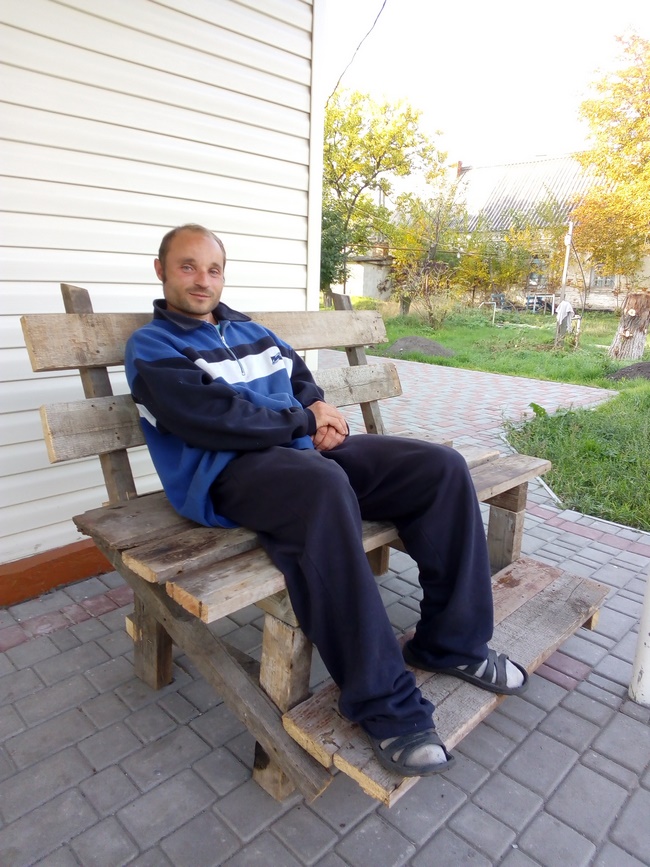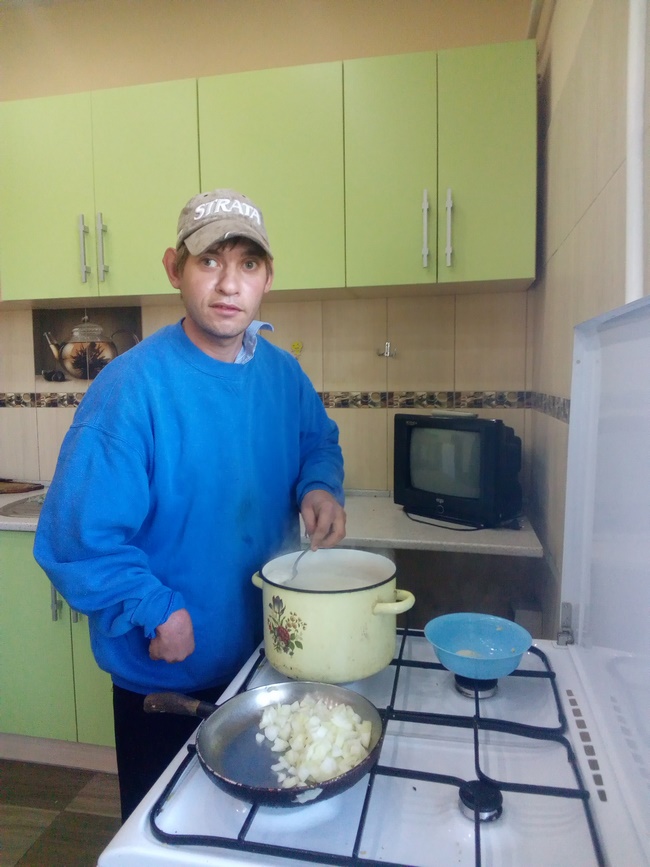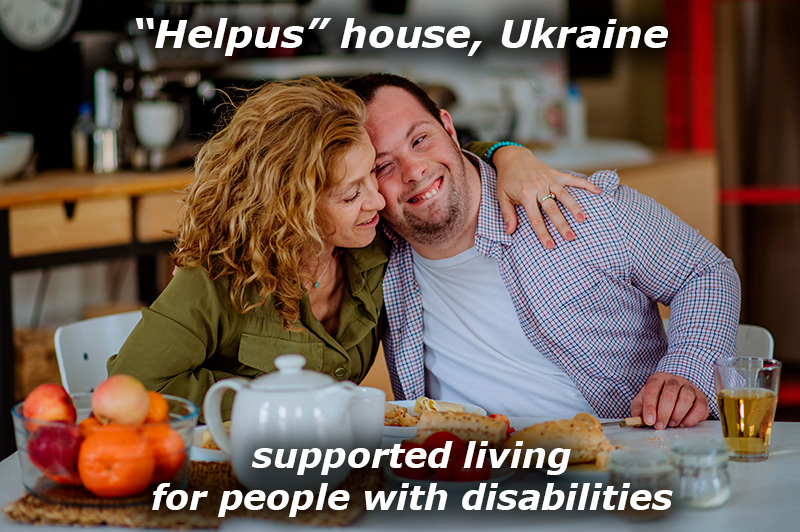
Black holes for people with disabilities
In the Zaporozhzhia region, there are places where you can get in, but where it is almost impossible to escape from - these are psycho-neurological institutions (PNI), also known as big nursing homes or residential centers. Usually they are located away from prying eyes, on small farms or the outskirts of settlements. Each PNI has its own cemetery, where most of the pupils find their last refuge.
People get into PNI in different ways. From orphanages and boarding schools, grown children with physical disabilities and developmental disorders (Down syndrome, cerebral palsy, epilepsy, schizophrenia, various degrees of mental retardation, hydro- and microcephaly and other congenital malformations) are sent here. Sometimes relatives can no longer cope with a person with a disability under their care, and hand him over to the PNI. In some cases, a person comes here due to an injury or mental illness, in the absence of relatives who can provide care. It happens that as a result of chronic alcoholism, dementia occurs, a person loses contact with loved ones, loses housing and ends up in a PNI. And a separate frequent case is the placement of elderly people in the PNI, often with various frauds with housing. Some of the PNI pupils have previous convictions, sometimes for murder.

Regardless of how a person got into the PNI, a significant part of the pupils face similar problems:
- the almost complete absence of the opportunity to leave the PNI "into the wild";
- contacts with the outside world are very limited, volunteers are not frequent guests in such institutions;
- total control over the life of pupils by the staff, the lack of effective ways to complain and protect their rights;
- most often, medical support is at a very low level;
- limited opportunities for leisure, recreation, travel;
- lack of individual space, overcrowding;
- inability to work, earn their own money and benefit society;
- cramped living conditions (rare bathing, poor clothes and shoes, insufficient food).
In the Zaporizhzhia region, about 2,000 people live in places of captivity called PNI, while, in our opinion, about 20-30% of the pupils could integrate into society with a little support from social workers.

Is there light at the end of the tunnel?
In the developed countries of the world, since the 60s of the last century, the reform of the system of psychiatric hospitals and PNI began. The most famous and successful reform was carried out in Italy in the 1970s and 90s, as a result of which the attitude towards people with psychiatric disorders changed, large psychiatric institutions were closed. Supported living centers, group homes and therapeutic communities have begun to be established around the world. For example, the Ark-L'Arche system of communities created by the Frenchman Jean Vanier has 140 communities around the world. The first community "Ark" appeared in Lviv.

Since 2012, the Helpus and Happy Child foundations have been trying to move the situation forward in the Zaporizhzhia region. Over the years, we have visited each of the 8 PNIs for adults several times with concerts and volunteer trips. Together with a charitable organization from the Cherkasy region, since 2013, eight pupils were able to leave the walls of PNIs, two more did this try, but returned to the PNI. We created Happy Home-5 for supported living for 7 children with disabilities, and furnished an apartment for 5 women at Veselovsky PNI.
Of course, the adaptation in society of these six guys and two women, PNI graduates, is not easy. Someone tries to constantly move from place to place, others find it difficult to manage finances and they "are recruited" into debt, and most hardly get used to the need to take care of themselves on their own, to do what they can. There is an acute issue with funding - after all, "in the wild" former pupils, having a disability of the 2nd group, receive only 392 $. pensions and hard to find work. There is no way to do without additional support from the foundations.
Maxim, Zhenya and "Happy House-5"

Maxim and Zhenya
These two young men, after some wanderings, live in "Happy House-5" in the village of Lyubimovka, Mikhailovsky district, Zaporizhzhia region. The guys live almost independently: they cook food, keep order in the house and on the site. We hope that these guys will become the backbone of the first group home in the Zaporizhzhia region created for seven former pupils of the PNI.
Zhenya is now 30 years old, and he spent 25 of them in PNIs. Zhenya has mild cerebral palsy and very rarely epileptic seizures. He can read and write, sing in the choir, loves to embroider icons, and sometimes he manages to sell his work. The guy is artistic and knows how to copy the sounds of different people and animals. Trying to transfer to another PNI to his beloved, he visited almost all PNIs in the Zaporizhzhia region. He dreamed of going "free", buying his own house and living there with his wife and children. He also dreams of seeing mother, twin brother and sister who live in Zaporizhzhia.

Zhenya
Life outside the PNI is not an easy thing for Zhenya, because you canпїЅt turn around on a small pension. Zhenya has problems with a permanent job, there are only occasional part-time jobs, so the Happy Child Foundation provides monthly support to the guy for food, utilities, and medicines.
Maxim will soon turn 35 years old, he spent 31 years in PNIs. He called the director of the children's psycho-neurological institution and educator dad and mom, and the head teacher became his godmother. As a teenager, Maxim mastered the basics of carpentry, sat at the console during discos, became seriously interested in powerlifting, lifting the barbell. With a weight of 48 kg, Maxim lifted a barbell weighing 110 kg, pulled himself up about 40 times, for 5 years he attended trainings in Zaporizhzhia every day, rode them on his own through the whole city. And yet, by the age of 30, Maxim seriously thought about how to go "free", to live independently without the daily control of staff. And now Maxim is close to his dream.

Maxim on a bench of his own making
Despite the difficulties of a free life, the guys are not going to return to the PNI. Maksim and Zhenya are honest guys who don't drink alcohol, are reliable and know how to get along with children. Maxim knows how to putty and paint well, to perform simple carpentry work. Zhenya loves to cook, embroider, sing, and with the only working hand to do any chores.
The guys need the support of honest strangers in managing finances, planning, and also in finding employment. In the meantime, there are problems with work, it is necessary to support the basic needs of Maxim and Zhenya in food, clothing, and paying utility bills. It is necessary to communicate with volunteers and friends who will help adapt to society after decades of living in the PNI system.
How to defeat a black hole?
It is not easy to make the transition from PNI to humane forms of care for people with disabilities across the state. This requires a reform of the social protection system, the adoption of regulations on small group homes, private and charitable homes. Private and charitable organizations need to be able to create their own small group homes, compete for funding, and compete with government PNI. It is necessary that the money пїЅfollowsпїЅ to a person with a disability, that is, it is sent not only to the PNI, but also to alternative institutions where this person lives. The process of this reform may take decades, if the outcome is favorable.
In the meantime, you can support the projects implemented by the "Happy Child" and "Helpus" charitable foundations. Now we are planning to accommodate five more pupils from PNI together with Maxim and Zhenya (there is already a queue of those who wish). But we cannot do without your support. Anyone can help, regardless of income level:
- become a volunteer at Happy Home-5 in Lyubimovka, come there for the weekend or for a few days (there are places for overnight stays), communicate with pupils, help them adapt;
- offer pupils feasible work with fair pay (cleaning the territory, agriculture, construction);
- help with food, clothing and footwear;
- transfer a working computer, router and pay for the Internet (110 UAH per month);
- invite pupils to visit, on an excursion to another city;
- help in the acquisition or transfer of bed linen, garden and household equipment;
- help pay utility bills;
- become a friend-fundraiser of the project and help raise funds for the creation of group houses in the Zaporizhzhia region;
- make a donation and receive full reporting on it (www.deti.zp.ua/donation marked "Donation for PNI graduates "")
Those who wish to help write to happy_home@deti.zp.ua, call +3 8 066 513 34 35 (viber), www.facebook.com/albert.pavlov
Articles and films about psycho-neurological institutions, addresses of institutions and stories of pupils on "Helpus"
Wisdom and kindness to all of us!
Photos from the life of Maxim and Zhenya in "Happy House-5":








